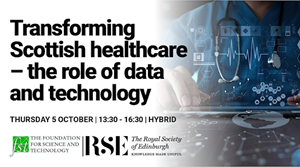EVENTS
The Foundation organises events on key topics in science, research, technology or innovation, bringing together parliamentarians, civil servants, industrialists, researchers, learned societies, charities and others. Those events focus in particular on areas where there are policy decisions needed, which in turn need to be informed by this wide range of inputs and viewpoints. Summary reports are prepared for all events, and these - along with presentation slides, videos of speakers and audio files - are available online after events.
Filter: Year 2023
Horizon Europe – making UK participation a success

- 2023
- The Royal Society or online
On 7 September 2023, the UK and the EU concluded an agreement for the UK to participate in the Horizon Europe and Copernicus programmes as an associate member. This opens the way for UK researchers to build on an expand research collaboration with partners in other European countries. But the extended period of uncertainty about the UK's participation before this announcement means that there is much that now needs to be done - by the UK government, funding agencies, universities, industry, and by our partners in the EU - to ensure that the UK maximises the opportunities that Horizon Europe provides. In this event, we discussed what needs to happen now to make sure that the UK achieves all it can from this associate membership.
Read MoreRisk and Resilience - Foundation Future Leaders Conference 2023

- 2023
- Glaziers Hall, London, or online
Science, technology and innovation have a major contribution to make to the complex challenges facing society. Designed specifically for early- to mid-career professionals with science, technology and innovation roles in the civil and wider public service, in industry and in the UK research community, this conference will examine three key issues - AI, the future of work, and energy security.
Read MoreInventing a Better Britain - How does R&D fit into a new UK economic strategy?

- 2023
- The Resolution Foundation, and online
Low productivity is the foundational cause of Britain’s recent economic malaise, and raising it is a top priority for policy makers. Public and private investment in research and development is a key route to boosting productivity and future economic growth. But businesses often complain that policy makers are failing to create an environment that encourages private investment. After the ONS revision, how much does the UK spend on R&D? How does our recent performance compare with other advanced economies? What barriers do we need to overcome to boost R&D spending? And how can it align it with a new economic strategy for the UK focused on boosting growth?
Read MoreNet Zero - UK and global progress

- 2023
- Online or in person at the Royal Society
At the end of November 2023, the world will come together for the latest climate conference, COP28. The latest IPPC report notes that the planet has already warmed to 1.1 degrees above preindustrial levels, and it is likely warming will exceed 1.5 degrees this century, with current national plans not enough to meet climate goals. Meanwhile in the UK, the Climate Change Committee’s report of June 2023 suggests that the rate of emissions reduction in the UK is too slow, making hitting our own emissions targets very difficult. In this meeting we will discuss the latest position in global and UK climate action, and assess what more we need to do both in emissions reduction, and in adaptation to the changes that are already coming.
Read MoreTransforming Scottish Healthcare – The Role of Data and Technology

- 2023
- Royal Society of Edinburgh, 22-26 George Street, Edinburgh, EH2 2PQ
The healthcare system in Scotland is facing major challenges, including waiting lists for operations, an ageing population, and shortages of staff. Part of the solution is the greater use of data and technology. What are these new technologies? How can they be deployed, both in medical care itself and in improving the operational efficiency of the health system? Are there specific benefits to more remote rural and island communities of greater use of technologies? What are the ethical, regulatory and practical issues involved in deploying this in the NHS? And what opportunities are there for Scottish universities and industry in developing these technologies.
Read MoreThe emerging shape of REF 2028

- 2023
- University College London and online
The UK’s Higher Education Funding Bodies made some initial decisions about REF 2028, following the work of the Future of Research Assessment Programme (FRAP). These were announced on 15 June 2023. This event, which was arranged jointly between the Foundation for Science and Technology, University College London, and the Research on Research Institute, in association with Research England, provided an early opportunity to digest and debate the outcomes of the announcements. The event was held in person at UCL and also online.
Read MoreEquity, Diversity and Inclusion in STEM

- 2023
- Royal Society of Chemistry, Burlington House, London W1J 0BA
In March 2023, the House of Commons Science and Technology Select Committee, launched its report on Diversity and Inclusion in STEM, which highlighted the important role government can play in promoting and supporting EDI. This report comes two years after the UK government published the Research and Development People and Culture strategy, and in the last two years a number of science and technology organisations and funders have reviewed Equity, Diversity and Inclusion (EDI) within their own organisations and across UK science and technology. This event will consider the current state of EDI in UK STEM and what more the Government can do in tackling the challenges. Hosted in collaboration between the British Science Association, the Foundation for Science and Technology and the Science Council, a panel of voices from across the sector will seek to provide some insights into what works and where the Government could usefully help the STEM community. Following the panel will be an opportunity for networking with policymakers, sector leaders and other key stakeholders.
Read MoreThe use of AI in the early detection of disease

- 2023
- Online or in person at the Royal Society
Recent developments have shown the potential for the use of AI in the early detection of diseases such as cancer, Alzheimer's and retinal diseases. What is the current state of this technology? What will this mean for clinicians and patients? What are the ethical implications? How do we regulate this rapidly evolving technology? These are just some of the questions that we hope to explore at this discussion event.
Read MoreThe UK Semiconductor Strategy

- 2023
- Online or in person at the Royal Society
The Government published its long-awaited national semiconductor strategy on 19 May 2023. This event explored the strategy and what it means for UK industry, both for silicon and compound semiconductors. Questions considered included: How do we ensure that the UK has a secure supply of the semiconductors it needs now and in the future? What does the UK semiconductor industry need to thrive? How do we maximise opportunities for next generation semiconductors? And how does all this sit within the Government's new Science and Technology Framework?
Read MoreThe Nurse Review of the Research, Development & Innovation Landscape

- 2023
- Central Hall Westminster or Online
The Independent Review of the UK’s Research, Development and Innovation Organisational Landscape, chaired by Sir Paul Nurse, was published in March 2023. This major review has a number of key conclusions and recommendations, which were discussed at this event. The Foundation's meeting on the issue was timed to feed into the Government response on the review, which is scheduled for later in 2023.
Read More